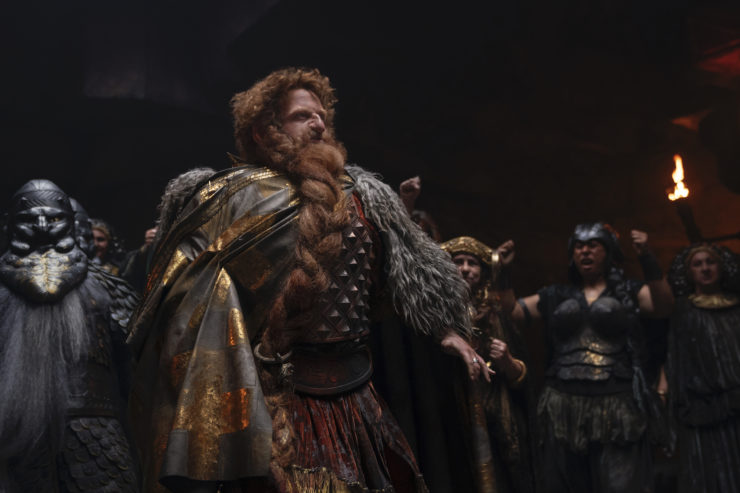The much anticipated The Lord of the Rings: The Rings of Power series is finally here, bringing with it new metaphors of light and dark, familiar landscapes, and, of course, Hobbits.
Oh, I mean Harfoots.
Episode One: “Shadow of the Past”
The episode opens on a voice over, as elven children play in the landscape of Valinor. One child, Galadriel (Amelie Child-Villiers), folds a paper boat and sets it in the stream, but another child throws rocks at the boat until it sinks. Galadriel attacks him before being restrained by her older brother, Finrod (Will Fletcher). The two talk about why boats float, and Finrod advises Galadriel about looking up for the light rather than down at the darkness of the water. Galadriel asks how to tell the difference between true light and light reflected on the darkness, and her brother whispers the answer in her ear.
The voice over describes the arrival of darkness and death for the elves as Morgoth rises to power. The elves leave Valinor to travel to Middle-earth and wage war against Morgoth, and then against Sauron. Finrod vows to find and destroy Sauron; when he is killed, Galadriel (Morfydd Clark) takes up his vow.
A group of armored elves travel through a snowy wasteland, led by Galadriel. One soldier argues that Sauron is defeated and that they should turn back and go home. They discover an icy fortress, and evidence of orcs whose dead bodies have been mangled by strange magics. Galadriel discovers the sigil of Sauron on an anvil. Other elves argue that the sign could be very old, and after fighting off a snow troll, they refuse to follow Galadriel any further.
Two men hike through the wilderness. After they are gone, Harfoots begin to pop out of the landscape, revealing an entire hidden encampment. Elanor “Nori” Brandyfoot (Markella Kavenagh) leads some children far afield to look for berries, but they retreat after she finds evidence of wolves. Later, her mother warns her that elves, men, and dwarves have reasons to fight for what they have, but that Harfoots survive by staying hidden.
In Lindon, a messenger comes to tell Elrond (Robert Aramayo) that Galadriel has arrived. They talk about her exploits, and he tells her that she went against the High King by continuing her mission to find Sauron. At a ceremony to honor Galadriel and the other soldiers, High King Gil-galad (Benjamin Walker) declares that the time of war is over, and that as a reward for their heroism the soldiers will be sent home to Valinor.
Elven watchman Arondir (Ismael Cruz Córdova) visits a town in the Southlands while on patrol. He lingers at a well with a human healer named Bronwyn (Nazanin Boniadi). Afterwards his fellow watchman scolds him, and warns of the dangers of human and elf romances. Returning back to the Watchtower, they are informed that the High King has declared peace, and that the elves are leaving the area.
Galadriel and Elrond visit a monument to the fallen elves, and Galadriel admits that she doesn’t know who she will be if they take away her identity as a soldier. She tells Elrond that the war she has seen will make a mockery of her songs in Valinor. Elrond tells her that only in the undying land will help that which is broken in her be healed.
Arondir goes to see Bronwyn, but they are interrupted by the arrival of a farmer with a sick cow. Arondir finds that the cow’s teat secretes a black substance, and decides to go to the east and see where the cow has been grazing—Bronwyn comes with him. They discuss the fact that the people here were once staunch followers of Morgoth, while back in town, Bronwyn’s son Theo (Tyroe Muhafidin) shows his friend an evil looking sword hilt he found hidden in a barn. Arondir and Bronwyn discover a town that has been burned to the ground.
Elrond admits to being troubled about Galadriel, and the High King tells him that he did the right thing in convincing her to return to Valinor. Gil-galad explains that Galadriel’s actions could have fanned the flames of the very evil she was trying to destroy. Elrond asks if this means that the King believes that Sauron is still out there, but is told not to worry, and that he is going to be assigned to work with Celebrimbor (Charles Edwards), an elven artisan and smith who Elrond greatly admires.
Galadriel and the soldiers stand on the deck of a ship as their armor and weapons are removed and set aside. The clouds part, showing a bright golden light, but Galadriel is resistant as the others begin to sing. In her memory, she hears herself asking her brother how to tell the difference between true light and light reflected off the darkness, and she hears his answer—that sometimes you must touch the darkness first. At the last moment, she pulls away and leaps off the ship and into the sea. As the clouds close again, the golden light changes briefly to a fiery red.
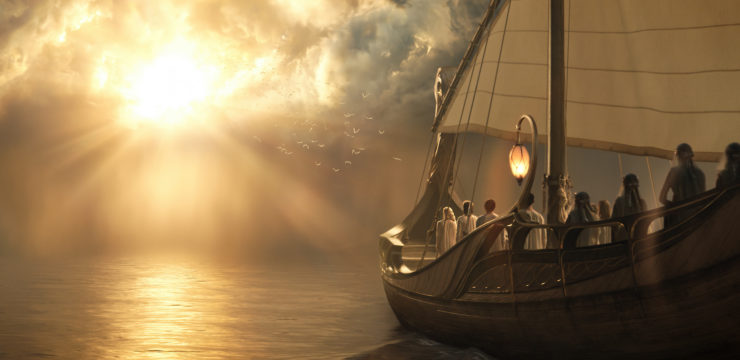
Gil-Galad finds a diseased leaf on the ground, and a comet passes overhead. It crashes near to where the Harfoots live, and Nori Brandyfoot hurries out to investigate. In the middle of the smoldering crater she sees a naked, unconscious figure.
Episode Two: “Adrift”
Nori stands at the edge of the pit, looking down at the unconscious man (Daniel Weyman). She is startled by the arrival of her friend, Poppy (Megan Richards) who urges her to get away. When Nori touches the man, he awakens, shouting at her in a strange language which affects the surroundings in odd ways. She holds his gaze and he stops, then collapses again. The girls steal a wheelbarrow and use it to move the stranger, arguing about where he comes from and what, exactly, he is. Nori settles him into a hiding spot, and tells Poppy that it feels like she was meant to find and help the man.
Arondir and Bronwyn explore the ruined town, and find a hole in the ground leading to a tunnel, one end of which runs towards Bronwyn’s home. Arondir urges Bronwyn to return home and warn her people, while he follows the tunnel to see where it leads. Later, Arondir encounters orcs in the tunnel and gets captured.
Celibrimbor tells Elrond that he wants to build a special new tower forge. The High King won’t give him enough workers to do the job, so Elrond proposes asking his friend, Durin IV (Owain Arthur), a dwarven prince. They travel to Khazad-dûm, where Elrond attempts to gain access but is told that Durin doesn’t want to see him. Elrond invokes an ancient rite and goes in alone. He is shown into a room where Prince Durin explains the nature of the challenge Elrond has invoked—a contest to split more rocks than one’s opponent. If Elrond wins, he will be granted a boon. If he loses, he will be exiled from all Dwarven lands.
Poppy finds her guest awake and drawing strange patterns in the dirt. Again he speaks in the strange language that affects the surroundings, but then he seems to recognize her and stops. She tries unsuccessfully to introduce herself, and offers him food. Back in the village, Nori’s father is injured, and Poppy comes to fetch her. Nori blames herself for not being there when her father was hurt.
Galadriel encounters a raft of people whose ship was destroyed by a wyrm. As they interrogate her, the creature arrives. Galadriel is pushed from the raft as another of the passengers (Charlie Vickers) separates himself from the others, escaping while his companions are killed. He helps her onto his raft and gives her water. Galadriel learns that orcs drove her companion from his home in the Southlands. She orders him to tell her everything and then take her there.
In the rock splitting trial, Elrond grows tired and eventually yields. He asks Durin to be the one to escort him out, and learns that Durin is angry because Elrond has been gone for twenty years, missing many important events in Durin’s life. Elrond apologizes, and asks to apologize to Durin’s wife as well. Princess Disa (Sophia Nomvete) is pleased to meet him and invites him to dinner. Durin agrees to hear Elrond’s proposal. Afterward, Prince Durin speaks to his father, King Durin III (Peter Mullan) about Elrond’s proposal. Durin III is suspicious of the elves’ motives., and shows his son something in a chest.
Bronwyn arrives home to find her house ransacked and a large hole in the floor. Theo emerges from a cupboard and tells her to run. An orc climbs out of the hole and Theo and Bronwyn manage to fight the creature off, stabbing it several times and then strangling it. Bronwyn cuts off its head and presents it to the villagers as proof that they are in danger. Packing his bag, Theo looks at the broken sword hilt. Somehow, blood is drawn from a cut on his hand onto the weapon, which begins to reform. Theo hears his mother calling and comes outside to leave with the other villagers.
With Poppy, Nori visits the stranger, apologizing for not being able to help him. The stranger whispers to the fireflies and they fly into a pattern, showing Nori a star constellation. She realizes that this is where he’s asking to go, and tells him that she knows where to find these stars—all the fireflies die.
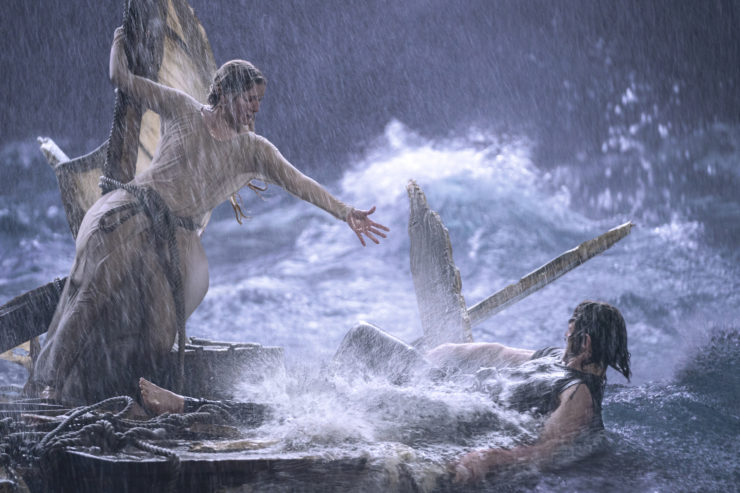
A storm batters the raft, and Galadriel ties herself to its mast. Lightning suddenly strikes the mast, dragging her over the side and into the water. The man ends up diving in to rescue her. Galadriel and her companion lie on the raft in the sun. She regains consciousness and looks up to see a figure on a ship looking over them, then collapses again.
Commentary
Peter Jackson wasn’t involved in the production of The Rings of Power and there is no official affiliation between the show and the film series, but it is undeniably evident that these episodes owe much of their visual language to Jackson’s films, especially his pacing and particular horror aesthetic. There are also many lingering close up shots of eyes, particularly Elrond’s, Nori’s, and Comet Man’s, which are unmistakably Jackson-inspired. In fact, there are far too many of them for Galadriel, to the point where it’s distracting.
Another, more enjoyable reference to the Jackson films gives us a clue as to Comet Man’s identity, though, when he cups the fireflies in his hands and whispers to them, using them to communicate his message to Nori. Whispering messages to insects is a Gandalf movie move after all—though at least by the time he ends up on the top of the tower in Isengard, he’s learned to temper his powers enough not to kill his mothy messengers.
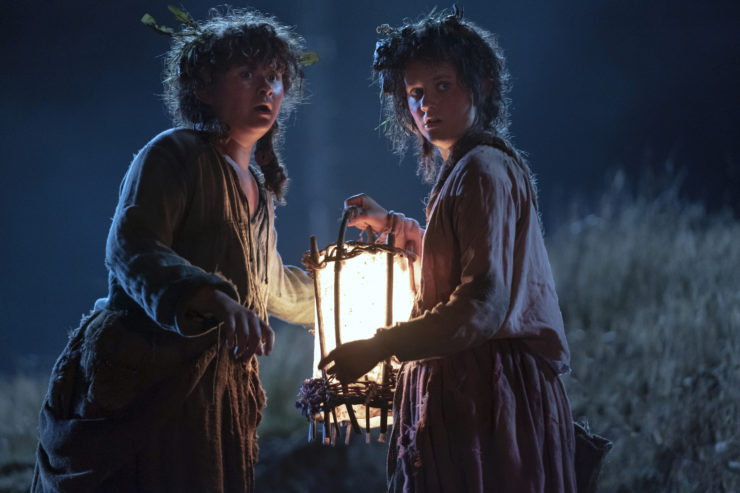
The show sometimes uses these homages to good effect, as in the example above. Galadriel’s quick slaying of the snow troll in Sauron’s abandoned fortress both shows her strength as a warrior and provides the first humorous moment of the series, using the contrast in the audience’s mind between this moment and the Fellowship’s encounter with the cave troll in The Fellowship of the Ring to pull that off. However, the similarities also often feel thoughtless or fall flat, and there are moments when the show seems to copy the movie visuals without apparent understanding.
Of course, some comparisons are truly unavoidable, given how large the Lord of the Rings films loom in our cultural consciousness, and how much they shaped the future of on-screen fantasy. The Rings of Power was even shot in New Zealand; you can recast Elrond and Galadriel, but you can’t recast Middle-earth itself, it seems. This puts The Rings of Power in a difficult position, and demands exceptional clarity from every visual, character, or plot choice. If the audience isn’t exactly sure what the show is communicating, the temptation to fall back on the films for clarity or comparison is hard to resist.
However, the show does have its share of visual differences, moments when it sets itself beautifully apart. The memorial trees, carved to represent fallen Elven warriors, were a particular highlight, as was the knightly armor of Galadriel and her companions, which evoked associations of medieval quests and holy knighthood. The scene on the ship to Valinor where the armor was ceremonially removed was touchingly symbolic, especially when the gorgets were taken off, as though the elves were being freed from an imprisonment.
A particular favorite detail for me are the breast plates that Arondir and his companions wear, featuring a Greenman-like face evocative of Ancient Celtic Art. Although Celtic patterns were certainly an inspiration in much of the elvish design in Jackson’s films, this particular type of image was never seen. And, given that the show’s promotional material states that Arondir is a Silvan elf, this design choice feels particularly apt.
The show also finds moments to develop some of Middle-earth’s cultures in new and interesting ways. Princess Disa tells Elrond about how her people sing to the rock and then the rock sings back, letting them know where and how to dig, and where not to. This information about how the Dwarves work with stone echoes the way that the elves sing to and converse with the trees. In a sad way, it also foreshadows the destruction of Khazad-dûm—one wonders if the dwarves forgot or ignored the singing when they delved too deep and woke the ancient evil of the Balrog.
All in all, the dinner scene with Durin, Disa, and Elrond is one of the best scenes, and it is particularly poignant to watch Elrond learn something new and beautiful about the Dwarves. Nomvete brings a warmth and a joy to the character of Disa that is truly lovely.
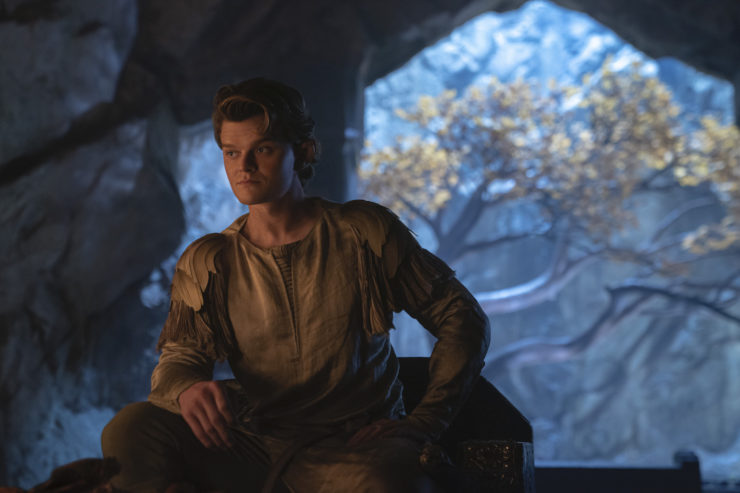
But it is the Harfoots that are the true highlight of these first two episodes. It is with them that the show finds its humor and soul, as is only appropriate, considering that they are the ancestors of Hobbits. Nori and Poppy are both a delight, and their relationship is somehow reminiscent of both Pippin and Merry’s as well as Frodo and Sam’s, without feeling overshadowed by either association. Their costumes are also a lovely, natural and pixie-like, with berries and twigs wrapped into curls and fabrics that feel like part of the landscape that the Harfoots so easily disappear into.
Nori’s character is also the clearest and most developed. We quickly get a good sense of her curiosity, determination, and stubbornness, and we also learn that she is the sort of person who takes responsibility for everyone and everything around her, as Poppy notes several times with a very Merry-like, long-suffering attitude. The script does a good job of giving all this information about Nori and her people quite seamlessly, without ever feeling heavy-handed, and their dialogue is the most natural of all the characters.
Elrond is also a surprising delight, and it is fascinating to see the character-building of this half-elf who is so eager and bright and yet uncertain of himself as well. The show hints that he experiences some prejudices and set-backs due to his mixed heritage, and shows that he is a very loyal friend. His chemistry with Durin was what really sold me on the character—as with the Harfoot scenes, Elrond’s interactions with the Dwarves mix serious moments with humorous ones, which makes the world of the show feel more three-dimensional and real than it did in the first episode, or than it does in Galadriel’s sections.
I did not expect the show to present me with an elf/dwarf relationship to rival Legoals and Gimli’s: Elrond’s comment that “Where there is love, it can never truly be dark” in reference to Durin’s home was a really unfair thing to do to me, personally.
In comparison to Elrond’s visit to Durin and all the Harfoot scenes, Galadriel’s exploits almost feel as though they belong to an entirely different script. Clark is doing her best to carry the material and has some absolutely perfect line deliveries—my favorite was her matter-of-fact “prepare yourself” when she notices the storm approaching. Unfortunately, much of her dialogue is painfully clichéd, and the scenes between her and the mysterious man on the raft fall quite flat as a result. At this point, her character feels like little more than a “strong female warrior” trope, and the entire plotline of meeting a cranky guy on a raft who argues with her for no reason, the storm, and the symbolic near drowning and last minute rescue all feels a bit trite. I found myself forgetting about Galadriel every time she was off screen, in favor of Dwarven rock-splitting contests and watching Nori, with her big Frodo eyes, try to make friends with a fallen angel.
Compared to Nori and Poppy, and even characters with less screen time such as Disa, we don’t know anything about Galadriel’s internal world, personality, or even her motivation. Sure, we know she took up her fallen brother’s oath, but not why: Did she feel a sense of familial duty, believing that such an oath must pass to Finrod’s kin whether she wants it to or not? Was she primarily motivated by a desire to avenge his death? Or perhaps, did she believe in that oath every bit as much as he did even before he died? I am drawn to the character, and mostly felt desperate for some point to latch onto her properly. Of course, the series has time to develop her, and with how much more enjoyable the second episode was than the first, I am optimistic that it will do so. But it is a shame that Galadriel’s scenes can’t hold up to other parts of these episodes.
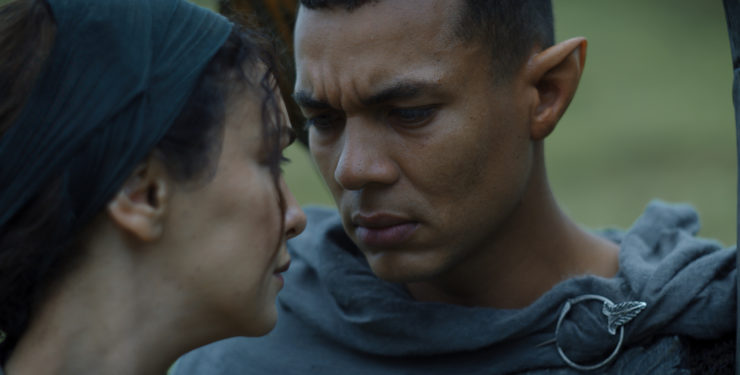
As far as character development goes, Bronwyn and Arondir lie somewhere in the middle of these two extremes. So far their scenes are mostly plot-driving, but we do to get little pieces of who they are as people. Bronwyn’s explanations about her work as a healer and the way she handles her fellow villagers after the orc encounter shows us the kind of person she is, while Arondir’s shy reserve, just as apparent around other elves as it is when he interacts with Bronwyn, piques the audience’s curiosity. Theo is also an intriguing puzzle, especially with the obviously evil sword he has gotten his hands on.
All in all, the first episode struggles to find its feet a little, but the second shows a great deal of promise, and I am excited to see what else the series has in store for us.
Join me next week for episode three!
Sylas K Barrett is a writer, actor, and longtime epic fantasy enthusiast. You can find his read of Robert Jordan’s The Wheel of Time here on tor.com.










